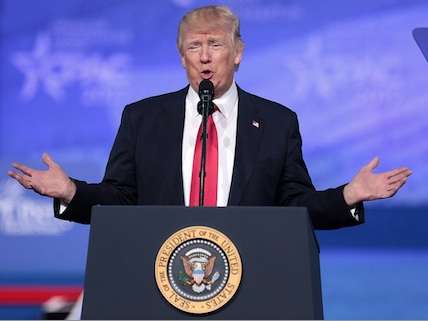Libertarian Legal Scholars Reject Trump Judicial Nominee's Views on 14th Amendment

One of President Donald Trump's federal court nominees favors an interpretation of the 14th Amendment that libertarian legal scholars have roundly rejected.
Kevin Newsom, the former Alabama solicitor general recently nominated by President Trump to the U.S. Court of Appeals for the 11th Circuit, is the author of a January 2000 article in the Yale Law Journal in which he argues that the Supreme Court's 1873 decision in The Slaughter-House Cases correctly held that the Privileges or Immunities Clause of the 14th Amendment offers zero protection for economic liberty. That view is hotly contested by libertarian constitutional experts.
At issue in The Slaughter-House Cases was a Louisiana statute that granted a private corporation a lucrative 25-year monopoly to operate a central slaughterhouse for the city of New Orleans. A group of local butchers challenged the law in federal court, arguing that the monopoly was a special-interest boondoggle that served no legitimate health or safety purpose and violated their fundamental rights to earn a living free from unnecessary government control. According to the butchers, the right to economic liberty was one of the privileges and immunities of U.S. citizenship recently secured against state abuse by the 1868 ratification of the 14th Amendment, which reads in part, "No State shall make or enforce any law which shall abridge the privileges or immunities of citizens of the United States."
From the standpoint of constitutional text and history, the butchers had a strong argument. The debates over the framing and ratification of the 14th Amendment make it clear that the provision was originally understood to protect economic liberty. Indeed, according to the principal author of the Privileges or Immunities Clause, Republican Congressman John Bingham of Ohio, "the provisions of the Constitution guaranteeing rights, privileges, and immunities to citizens of the United States" includes "the constitutional liberty…to work in an honest calling and contribute by your toil in some sort to the support of yourself, to the support of your fellowmen, and to be secure in the enjoyment of the fruits of your toil."
But the Supreme Court saw things differently. Adopting a posture of judicial deference, the Court ruled 5-4 in favor of the state legislature and effectively eliminated the Privileges or Immunities Clause from the Constitution. According to the majority opinion of Justice Samuel Miller, the Court had no business acting as "a perpetual censor upon all legislation of the States." To rule otherwise, he said, would "fetter and degrade the State governments." The Privileges or Immunities Clause basically offered no real protection at all, Miller insisted, except for a handful of mostly inconsequential federal rights, such as the right to access federal waterways. Slaughter-House rendered the clause toothless against virtually all state action.
Because Slaughter-House was the first case in which the Supreme Court interpreted the meaning of the new 14th Amendment, the ruling had a transformative impact on the future course of American law. Its significance cannot be easily overstated.
Today, a growing number of constitutional originalists, particularly those associated with the libertarian wing of the conservative legal movement, have concluded that Slaughter-House was wrong the day it was decided and therefore deserves to be confined or even overruled by the Supreme Court.
For example, according to Clint Bolick, the Institute for Justice co-founder who currently serves as an Arizona Supreme Court justice, Slaughter-House is "one of the worst decisions in American law." In Bolick's view, the ruling eviscerated "one of the most sacred and central rights of Americans: economic liberty, the right to pursue a business or occupation free from arbitrary or excessive government regulation." Georgetown law professor Randy Barnett, one of the most influential originalist scholars at work today, has likewise concluded that Slaughter-House "ignored the original meaning" of the 14th Amendment.
To be sure, Slaughter-House has had its defenders, particularly among the school of legal conservatives who favor a more deferential judiciary. For example, the late Robert Bork, who famously maintained that, "in wide areas of life, majorities are entitled to rule, if they wish, simply because they are majorities," insisted that Slaughter-House represented a "sound judicial instinct" and should be applauded as "a narrow victory for judicial moderation." Along similar lines, Ken Blackwell of the Family Research Council, writing with Ken Klukowski of the American Civil Rights Union, has argued that "what's so important about [Slaughter-House] is that there's nothing in the Constitution about such an economic right." If the case is ever overturned, the two have argued, "activist" judges might "use the Privileges or Immunities Clause to challenge state and local labor laws, commercial laws, and business regulations around the country."
Kevin Newsom, Trump's nominee for the 11th Circuit, falls in the Bork-Blackwell-Klukowski camp. In the Yale Law Journal, Newsom praised the Slaughter-House majority opinion for its "judicial restraint" and for its opposition to "the constitutionalization of laissez-faire economic theory." When it comes to the "economic rights claimed by the butchers" in Slaughter-House, Newsom maintained, the Court was right to conclude that "the 14th Amendment did not safeguard [them] against state interference."
Newsom's views on the 14th Amendment thus put him directly at odds with the flourishing camp of libertarian-minded lawyers, judges, and scholars whose influence on the conservative legal movement has been on the upswing in recent years.
It remains to be seen if this clash of constitutional visions will play any role in Newsom's confirmation hearings before the Senate Judiciary Committee.


Show Comments (21)